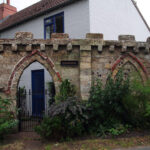30 March 1856: Future prime minister H.H. Asquith (3) and his brother lead a procession of children through the streets of Morley to celebrate the end of the Crimean War
Herbert Henry Asquith. 1928. Memories and Reflections, 1852-1927, Vol. 1. London: Cassell and Co. Get it:
.Unedited excerpt
If an excerpt is used in the book, it will be shorter, edited and, where applicable, translated.
Almost my earliest recollection is of our village celebration at Morley of the peace at the close of the Crimean War in 1856. My brother and I marched with much pride through the streets at the head of a procession of children, carrying two home-made banners, on one of which was inscribed “Peace on Earth” and on the other “Goodwill towards Men.” We were thus unconsciously among the early pioneers of the creed of the League of Nations.
Comment
Comment
I am assuming that this refers to spontaneous celebrations in Morley on that same happy Sunday as in Leeds, of which the Mercury writes:
Looking to the fact that peace has for several days past been regarded as virtually concluded, the intelligence of the formal signing of the treaty of peace by the plenipotentiaries in Paris was received at Leeds yesterday with a greater amount of enthusiasm than might have been anticipated. Still, as compared with the day of the reception of the new of the fall of Sebastopol, the state of Leeds yesterday was calm and quiet in the extreme. That, however, was a day the like of which few of us in Leeds may look upon again. When the news became pretty generally known in Leeds … flags and banners began to show themselves over or in front of public buildings, warehouses, mills, offices, shops, and other places of business. Prominent in this display were the new town hall, the board of works, the court house, and places of business and private houses in Briggate, Kirkgate, Albion Street, Commercial Street, Boar Lane, Park Row, Park Lane, Wellington Street, Woodhouse Lane, and other leading thoroughfares; and as the day advanced these signs of rejoicing increased in number and fluttered in abundance in all parts of the town. Nor were the good folks without their noisy demonstrations of joy. Cannon of almost every calibre were extemporised in all quarters, and belched forth their harmless powder to welcome the advent of “Peace and Plenty.” When evening set in, and the working classes were released from toil, the streets became filled with promenaders, and bands of music appeared, adding by their enlivening strains to the gaiety of the scene. In Briggate, Mr. Peacock, draper, illuminated his premises; but his was, so far as we saw, the only demonstration of that kind. Generally the feeling amongst the people appeared to be one of not unmixed rejoicing. Almost every man was asking his neighbour what were the terms of peace? – what guarantees had been obtained from Russia? – when would the precise terms be known? – whether they were really satisfactory, and such as would ensure a safe and a lasting peace? Of course, “Nobody” could answer the questions which “Everybody” was asking: and then “Everybody” shook his head, and made up his mind to exercise the Englishman’s much-loved privilege of grumbling – first grumbling that the terms were not at once disclosed, and next grumbling by anticipation at those terms, in the full belief that if they were really and truly good, they would have been stated at once. Others, again, would have dearly liked “another slap at the Russians,” because they were persuaded that in the next campaign England would have been able to show what she can do when once thoroughly roused and fully prepared for the fight – that she would, in fact, be “A1,” in 1856-7, which she was not in 1854-5. But upon reconsideration, all agreed that it is best as it is – that it would be unchristian and inhuman to sacrifice the lives of our fellow creatures merely for the military glory of our country. So it was agreed on all hands that the restoration of peace is really a subject for hearty rejoicing; and the rejoicing commenced in Leeds last evening accordingly. (Leeds Mercury 1856/04/01)
Something to say? Get in touch
Similar
Comment
Comment
Cottingham’s ruling came the following day (Leeds Mercury 1835/09/26).
No time to include the rest of the article, but the Tory objection to Edward Baines Senior, included here is amusing. The addresses given by them in an 1837 borough poll book are on King Street and Park Place, with offices on Briggate (Perring 1837):

In 1838 the Leeds Mercury proposed a solution:
In the borough of Leeds, where there have never at any election been found at the poll more than about 4,000 voters, there are at the registration of the present year, no fewer than 3,400 objections! It is true that the number of objections made by each party is nearly equal; and no doubt both parties justify their conduct on the ground of self-defence; but if the bill of the last session had passed, by which it was provided that the grounds of objection should be stated in the notice, and that the persons making objections without any reasonable and probable cause, should be obliged, on the order of the Revising Barrister, to pay costs to the party objected against for the trouble and loss of time consequent upon attending to support his vote, it is highly probable that, instead of three or four thousand objection, the number would not have amounted to half that number.—Leeds Mercury.
Something to say? Get in touch
Search
Donate
Music & books
Place-People-Play: Childcare (and the Kazookestra) on the Headingley/Weetwood borders next to Meanwood Park.
Music from and about Yorkshire by Leeds's Singing Organ-Grinder.





 Bluesky
Bluesky Extwitter
Extwitter